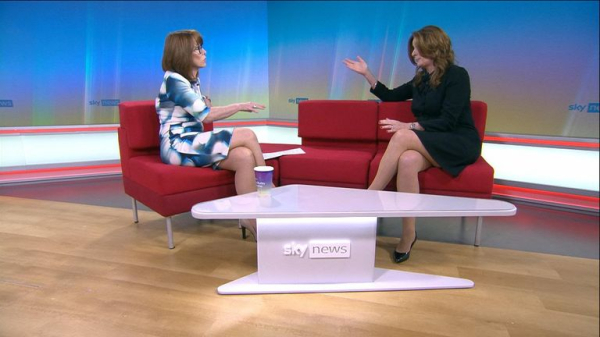Schools won’t have to pay to fix crumbling concrete, minister says

Schools affected by collapse-risk concrete will not have to pay for repairs out of their budgets, the education secretary has insisted.
Gillian Keegan told Sky News there will be no new money to fix the problem, but the costs will be covered by the Department for Education (DfE).
There has been a growing row over who will pay to pick up the bill for repairs to reinforced autoclaved aerated concrete (RAAC) after the government announced last week that more than 100 schools in England would have to close or partially close because of the risks associated with it.
Labour has accused the government of being in “complete chaos” over the issue and accused the prime minister of putting lives at risk by slashing funding for school refurbishment when he was chancellor.
Politics Live: Speculation grows over Labour reshuffle today

Ms Keegan said ministers had already procured stock of portable cabins for schools that need temporary accommodation – and the DfE is paying for this “directly”.
She said: “We have eight structural surveying firms who go in and do the surveys.
“We have three portacabin providers, so we’ve laid up a stock of portacabins so that people can be prepared quickly to be able to do that if they need temporary accommodation. And we’ve also looked at a propping company that’s nationwide.
“The Department for Education will pay for all of that.”
Ms Keegan could not say how much funding would be ringfenced towards the issue but admitted it was likely to cost “many, many millions of pounds” – as some schools will have to be rebuilt.
Asked if schools that are already strapped for cash will have to find more money, Ms Keegan insisted: “No, we will pay for that.”
Asked if the money will come out of school budgets, Ms Keegan said: “No. It’s coming out of the Department for Education.”

On Sunday Chancellor Jeremy Hunt said he would “spend what it takes” to address the problem, but Treasury sources later said money for repairs would come from the Department for Education’s (DfE) existing capital budget.
Shadow education secretary Bridget Phillipson said she was concerned that “raiding” the DfE’s capital budget – money for buildings and infrastructure – to fund repairs could have a negative effect in the long-term.
The government has admitted more classrooms could be forced to shut as further assessments are made of the risks of RAAC.
Ministers have promised to publish a list of the schools affected “in due course” but Labour has threatened to force a vote to compel its publication next week.
Thangam Debbonaire, the shadow leader of the House of Commons, told Sky News the full scale of the problem is still unknown and ministers must “come clean to parents, staff and pupils” and publish the list of schools affected.
She said the Tories “cancelled the building schools for the future plan” and under Rishi Sunak as chancellor “funding for school refurbishment was halved in 2021, by which time they already knew about the RAAC”.
“The Secretary of State appears to be just so weak on getting a grip on this problem and parents are left in the dark for yet another day,” she said.
The government changed its guidance on RAAC last week after the collapse of a beam previously considered safe.
But concerns about RAAC – a lightweight concrete used up until the mid-1990s – in public buildings were raised in 2018, prompting accusations that ministers have failed to act quickly enough.
Experts have warned the risks may extend beyond schools to hospitals, court buildings and prisons, where the material is present.
